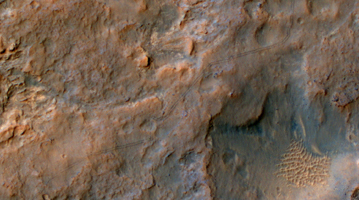
Click on the image for larger close-up versionTwo parallel tracks left by the wheels of NASA's Curiosity Mars rover cross rugged ground in this portion of a Dec. 11, 2013, observation by the High Resolution Imaging Science Experiment (HiRISE) camera on NASA's Mars Reconnaissance Orbiter. The rover itself does not appear in this part of the HiRISE observation.
Curiosity has been on the move. By the time this image was taken, it had driven about 2.86 miles (4.61 kilometers) since its August 2012 landing in Gale Crater. This enhanced color image shows where the rover zigzagged to avoid steep slopes and other obstacles on its route toward its long-term destination on the lower slopes of Mount Sharp. Curiosity is progressing from a bright dust-covered area to a region with a darker surface, where windblown sand scours the surface relatively free of dust. For scale, the two parallel lines of the wheel tracks are about 10 feet (3 meters) apart.
The image is one product from HiRISE observation ESP_034572_1755. Other image products from this observation are available at http://uahirise.org/ESP_034572_1755.
HiRISE is one of six instruments on NASA's Mars Reconnaissance Orbiter. The University of Arizona, Tucson, operates HiRISE, which was built by Ball Aerospace & Technologies Corp., Boulder, Colo. NASA's Jet Propulsion Laboratory, a division of the California Institute of Technology in Pasadena, manages the Mars Reconnaissance Orbiter Project for NASA's Science Mission Directorate, Washington.

